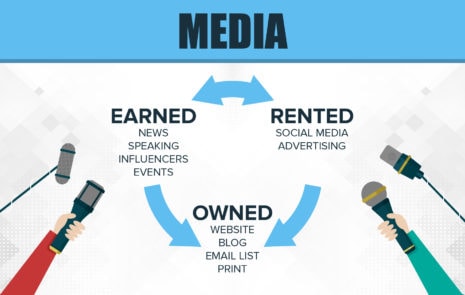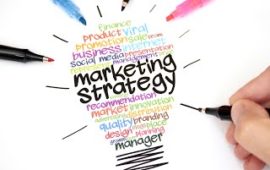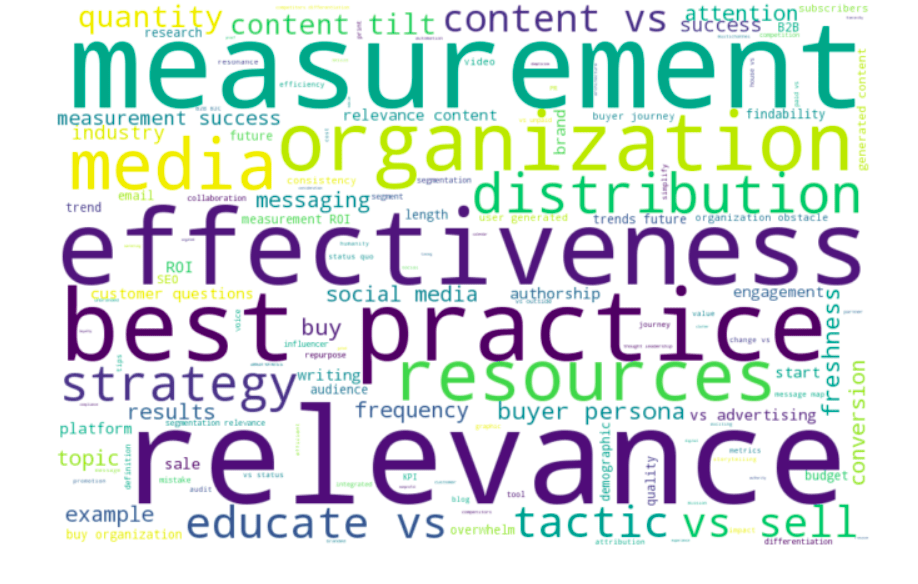
Top 100 Content Marketing Questions: What marketers’ questions on content marketing reveal – graphic
Which content marketing topics matter most to marketers?
The future of content marketing will be all about customers’ questions.
As I predicted in Joe Pulizzi’s blog:
Content marketing winners will listen intently to buyers’ questions and weave teaching into their companies’ DNA.
They’ll put listening before yelling, showing before telling, and teaching before selling.”
Why are questions so important to content marketing?
When you discover your audience’s top questions, you can create content that’s far more relevant to the audience and performs better in search engine optimization (SEO) and search engine marketing (SEM).
This blog will help you learn how to discover what’s important and relevant to your customers, and how to gather and analyze your customers’ questions.
I put this idea into practice by asking hundreds of marketers, coast to coast, to write down their top questions on content marketing. Since April 2017, I’ve gathered more than 2,100 questions from marketers who participated in my content marketing workshops.
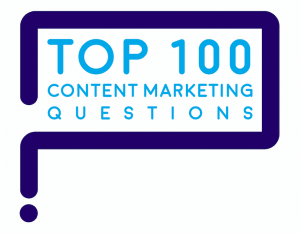
By gathering marketers’ questions, I wanted to find out:
- What do you and other marketers want to learn about content marketing?
- What are the steps in the content marketing journey? Where are marketers in their journeys?
- Where do you get stuck?
- Which pain points do you need to resolve to move forward?
Marketers’ questions about content marketing reveal a lot.
Verbatim questions show what you want to know about content marketing, what frustrates you about it, and how far along you are.
I focused on marketers’ questions because people’s questions provide uniquely useful insights about the people in any audience. Questions:
- Reveal what the audience wants to know.
- Point to key topics that the audience is interested in.
- Shed light on obstacles people must overcome to move forward.
Collect customer questions before you create content marketing assets.

Customer questions are the missing link in most content marketing. They’re a powerful way to gain insights into what people in your audience most want to know.
But all too often, customer questions get overlooked by marketers.
In fact, every marketer can improve the quality and relevance of their content just by learning their customers’ 100 most important questions — then, doing the work to create the best answer on the Internet for each question.
Most marketers have not yet tackled the customer question opportunity. In my workshops, I always ask what marketers know about their customers’ questions. For example, “Hold up your hand if you know what your customers’ top 100 questions are.”
In workshops with more than 1,000 marketers, so far no one has put up a hand. That tells me marketers are missing a huge opportunity: to create valuable content that matches searcher intent from their customers’ questions.
For answers to the 100 most important content marketing questions, subscribe to our blog.
Squeezing all the value from customer questions takes more than an FAQ page.
Companies that lump customer questions all on one FAQ page create a webpage that straddles too many various topics.
The FAQ page approach confuses Google's search algorithm because it can't figure out the one main topic of the webpage. The lack of one main topic leads to low search rankings.
A better approach is to collect customers’ top questions and answer questions one topic at a time, each on a separate web page on your site. That approach makes each webpage subject more clear to customers and to Google, as Andy Crestodina notes.
Can your buyers search and find answers to their top 100 questions on your website? If not, answering customers’ top 100 questions may be your biggest single opportunity to boost website traffic and content marketing results in the year ahead.
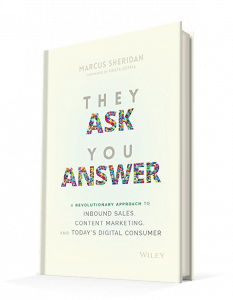
By taking a disciplined approach to capturing and answering customer questions, Marcus Sheridan turned around River Pools and Spas, a story he tells in the book They Ask You Answer. I'm sure that great Q&A content will boost your results, too.
Knowing your customers’ top questions means you can create content that’s far more relevant, far more likely to be sought after and used. Real customer questions improve SEO results too. So, what’s the best way to proceed?
Start by gathering hundreds of customer questions. Here are 14 ways to do so.
Choose one or more approaches that fit your company’s culture and content needs:
- Talk to customers face to face in a retail store or a place of business.
- Collect customer questions face to face, at a trade show or event — via a survey, or by giving an incentive.
- Phone customers one-on-one.
- Go on sales calls and note buyer questions.
- Sit next to customer service reps in a call center and write down questions. Or give call center reps incentives to write down questions word for word.
- Gather questions from customer chat.
- Harvest questions from customer e-mails.
- Do a Google search and collect questions from the “People also ask” box.
- Do a YouTube search and start to ask a question (without completing it) so you can see customer questions.
- Use the BuzzSumo question analyzer, which aggregates questions from many websites, including Yahoo, Amazon and Quora.
- Examine a topic on answerthepublic.com.
- Search customer questions on Amazon.com.
- Seek questions at Quora.com.
- Ask sales or customer service to write down each question they hear from customers.
Who were the marketers that contributed questions for this study?
For this analysis of content marketing questions, I gathered questions from marketers face to face. Questions came from marketers in business to consumer (B2C), business to business (B2B), government and nonprofit organizations such as these:
- AAA Northeast
- AIG
- AutoNation
- Bayer
- Bemis
- Be the Match
- CarMax
- Cisco
- City National Bank
- Exxon Mobil
- Farmers Insurance
- GE
- GlaxoSmithKline
- HP
- Humana
- Ingersoll Rand
- Intel
- Kaiser Permanente
- KPMG
- New York Life
- Rustoleum
- See’s Candies
- Sony
- Subzero
- USAA
- Walgreens
- West Virginia University
- Yamaha Music.
Thanks to each marketer who asked a question to make this analysis possible.
How to analyze and understand your customers' questions
When Jonah Berger, a professor at the Wharton School at the University of Pennsylvania, studied which content becomes viral on the Internet, he found that the usefulness of information is a key driver. How content is innately useful.
Among B2B buyers, the most popular type of content is prescriptive how-to content. Some 97% of buyers seek content that lays out a step-by-step formula for success, says the Demand Gen 2017 Content Preferences Survey Report.
In fact, the number one question word on the Internet is how, which indexes at 99 in Google Trends, followed by what (65), when (17), why (13), and where (12).
People’s questions on the Internet:
how, what, when, where, why

For more answers to content marketing questions, subscribe to our blog.
This finding begs a question:
Are marketers seeking know-how on the Internet as much as consumers are?
To find out, we plugged in hundreds of marketers' questions on a spreadsheet, then tagged each question with the topic(s) raised and the marketer’s company.
The first round of analysis involved about 600 questions. It showed that marketers are overwhelmingly interested in the how of content marketing. In fact:
- 54% of marketers' questions begin with how.
- 34% of questions begin with what.
- 7% of questions begin with when.
- 4% of questions begin with where.
- Only 1% of the questions begin with why.
Marketers’ questions on content marketing:
how, what, when, where, why
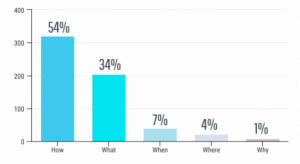
The need to know how appears among both consumers and marketers. This emphasis on how shows that marketers act like most people as they search the Internet with content marketing questions.
Why do people so often ask how? Because people love useful information, especially how-to information. Some of the most valuable content marketing created is about how to succeed, at any endeavor.
In the first round of analysis, we identified the meta-topics that marketers want to know more about:
- 40% of marketers' questions are about buyers.
- 23% of the questions are about marketing.
- 22% of the questions are about content.
- 15% of the questions are about the organization.
Marketers’ questions about content marketing by meta-topic
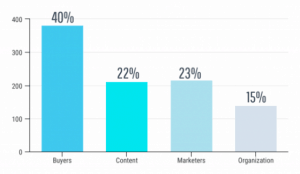
After completing the first-round analysis, we doubled the size of the question set to 1,200 questions. As Christopher S. Penn suggested, we applied text analysis to find out:
- Which of the 1,200 marketers’ questions are most important?
- Are there any significant differences between B2C and B2B marketers?
- What do marketers’ questions reveal about their worries and pain points?
- Which stages of the journey are marketers in, based on their questions?
This word cloud shows the most significant topics that marketers asked about:
Significant words: Marketers’ top content marketing questions

To narrow down this wide-ranging set of topics, we created a word cloud of the question tags, to show which content marketing subjects are of most importance to marketers.
Significant words: Marketers’ top content marketing topics
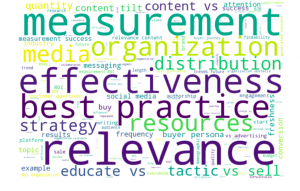
At each step in the content marketing journey, marketers ask different questions and seek to learn about different topics.
Text analysis identified 6 distinct steps in a marketer’s content marketing journey. We named these steps:
- Discover
- Fit
- Plan
- Learn
- Optimize
- Measure.
The number of questions asked at each step in the content marketing journey varies widely, as you see here:
Marketers’ questions mapped to steps in the content marketing journey
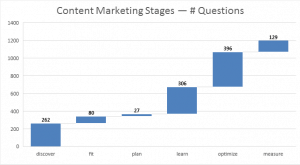
Here’s what happens during each step in the content marketing journey:
1. DISCOVER - In the discover step, marketers seek to discover the basics about content, what it is and how it works. 22% of marketers’ questions concern the discover step in the content journey, including:
- What form of content resonates with consumers?
- Where should content be – on our site – or should we meet users where they are?
- What are the biggest content marketing success stories and how big of an impact has it had on those businesses?
2. FIT - In the fit step, marketers look for ways to get content marketing to fit into the marketing department and into the company’s culture and organization structure.
At this step, marketers need to educate and persuade executives, subject-matter experts, and other marketers about content marketing. Just 7% of questions concern the fit step in the content marketing journey, including:
- Who should be responsible for content within a marketing department?
- Whose role is it to produce the content – product managers, subject matter experts, marketing?
- How to truly adopt [content marketing] across teams, projects, over time?
3. PLAN - Marketers raise questions about how to start creating a plan for strategic content marketing. But only 2% of questions concern the plan step, including:
- What is the most efficient/effective content marketing platforms for beginners?
- How do we (a B2B company/site) start?
- What is the best step to getting started without the hindrance of protocol, red tape, everyone's approval, for a company this size?
4. LEARN - Marketers ask lots of questions to learn content marketing fundamentals. Exactly how can they get from Point A to Point B? 26% of marketers' questions are about the learning step in the content journey, including:
- How do you organize content to make it helpful?
- How do we make a content plan that targets users’ interests (and keep it relevant)?
- How do you draw people in when you don't control the medium?
5. OPTIMIZE - Once marketers start to do content marketing, they want to find out how to optimize content to do it even better. 33% of marketers’ questions are about how to optimize content and production, including:
- Do most places have dedicated content marketing groups?
- How do you come off as sincere and not fake/contrived?
- Frequency and amount – how much is too much?
6. MEASURE - When content marketing is up and running, marketers focus on how to measure performance and success. They need to prove that content is working by measuring return on investment (ROI) to justify it. 11% of marketer questions are about the measurement step in the content journey, including:
- What are the most valuable KPIs and measurements in content marketing?
- How can we effectively measure ROI?
- How do you accurately measure sales generated by content marketing?
To boil it down, we created this graphic that maps out the 6 steps in marketers’ content marketing journey.

What matters most to marketers?
We used a combination of text analysis and search frequencies to determine which of the 1,200 questions are the most important.
Of marketers’ top 100 most important questions, 40 questions include the words measure, perform, and success.
The most frequently asked question about content marketing – How do you measure success? – appears 3 times in the top 100 questions, in addition to the closely related question How to measure success?
Marketers’ #1 focus is how to achieve success in content marketing, measure performance and improve the results.
Marketers’ obsession with achieving measurable success begins early and continues throughout the content marketing journey.
To determine which questions are most important to marketers, we applied text analysis to find:
- N-gram phrases (phrases of various lengths) and their search frequencies in the questions
- Noun phrases (sentence subjects and objects) and their search frequencies in the questions
- The uniqueness of each question’s tags.
What are n-grams? In text analysis (or computational linguistics) an n-gram is a contiguous sequence of n items from a given sequence of text or speech. These items can encompass phonemes, syllables, letters, words, or phrases. We collected word and phrase n-grams directly from the 1,200 verbatim questions.
Are there any differences between B2C and B2B marketers?
The following chart shows that, indeed, B2C and B2B marketers have distinctly different primary concerns about content marketing.
The chart below summarizes a lot of information. Here's how to read it:
- The importance of each question is determined by how many people ask the same or similar questions.
- The steps in the content marketing journey where marketers encounter specific problems and obstacles appear higher in the chart.
- The steps with a wider assortment of long-tail questions appear lower in the chart.
- Questions of greater concern to B2C marketers appear farther to the left.
- Questions of greater concern to B2B marketers appear farther to the right.
Differences between B2B and B2C marketers’ questions
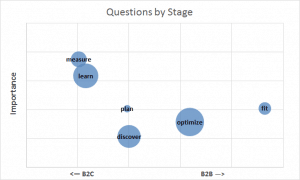
The #1 difference between B2C and B2B marketers is about fit.
B2B marketers are struggling to make content marketing fit into their organizations. They're concerned about how content marketing fits into the marketing department, the company culture and the organization chart.
B2B marketers are likely to ask more questions on how best to work with others – in marketing, with product managers, with subject-matter experts, with legal, and with executives. B2B marketers actively seek evidence they can use to get others aboard the content marketing bandwagon.
The #2 difference between B2C and B2B marketers is about measurement.
B2C marketers focus on measurement more than B2B marketers.
B2C companies have a harder time attributing results to any one activity such as content marketing, because they already have established advertising, promotion, public relations, and related functions. That means it’s more difficult for B2C marketers to prove that sales, revenue and results came specifically from content marketing activities.
The #3 difference between B2C and B2B marketers is about learning.
B2C marketers are more interested in the learn step of the content marketing journey. This finding suggests that B2C marketers are likelier to focus on content marketing fundamentals.
The emphasis on fundamentals makes sense because in B2C companies, content marketing is a new kid on the block.
Other differences between B2C and B2B marketers are less pronounced. B2C marketers place more slightly emphasis on the plan and discover steps in the content journey, while B2B marketers place more emphasis on the optimize step.
Another way to see the differences between B2B and B2C marketers is on a radar plot.
Differences between B2B and B2C marketers’ questions
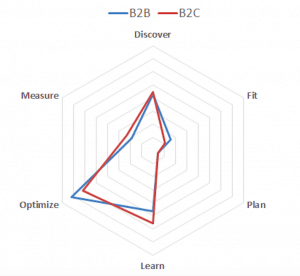
What will happen next with these 1,200 questions on content marketing?
Going forward, I will blog answers to your most important questions about content marketing, one topic at a time.




